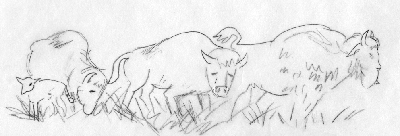Biographical sketch of Orville Sutherland Cox, continued
3 Heading West
An incident that illustrated the pioneer life of 1845-6 is told in the story of the “Last Match.” In the winter of 1845-6 Orville S. Cox and two Whiting boys, cousins of Elvira, went from Pisgah with ox teams and wagons down into Missouri with a load of chairs to sell. Whitings had a shop in which they manufactured chairs. Being successful in disposing of their chairs, and securing loads of bacon and corn, they were almost home when and Iowa blizzard, or hurricane, or cyclone, or all in one, struck them. They had no modern “tornado cellars” to flee into and no manner of shelter of any kind. The cold was intense; the wind came from every direction; they were all skilled backwoodsmen and knew they were very close to their homes; but they also knew that they were hopelessly lost in that swirling wind and those black clouds of snow. They and their oxen were freezing, and their only hope of life was in making a fire and camping where they were. Everything was wet and under the snow, and an arctic wind in the fierceness of unclaimed violence was raging around them. At first, they unyoked the oxen that they might find some sort of shelter for themselves. Then with frost-bitten fingers they sought in the darkness and storm for dry fuel. The best they found was damp and poor enough—and now for a match. Only three in the crowd, and no such matches as we have in these days either. Inside a large wooden bucket in which they fed grain, they carefully laid their kindling. Then turning another bucket over it to keep out the falling snow, and hugging close over the keep the wind off, they lifted the top bucket a little and one of the Whiting boys struck a precious match. It flickered, blazed a moment against the kindling, and was puffed out by a draft of wind. Another match was taken, and it died almost before it flared. Only one match remained to save three men from certain death. Their fingers were so numb they could not feel, and every minute increased the numbness. “Let Orville try; he is steadier than we”, they said. So Orville, keenly sensing his responsibility, took the tiny splinter of wood, and struck the spark; it caught, it blazed, and the fire lived and grew.
Now they were in the woods and the fuel was plentiful and soon a roaring blaze was swirling upward. The cattle came near, and although their noses and feet were frozen, their feet grew new hoofs and their noses healed of frosted cracks. When the storm broke and light appeared, they found themselves only a few rods from their home fences.
For a good reason, Orville was not in the Battalion draft. The Whiting boys, Sylvester Hulet, and Amos Cox were. But Orville was very busy manufacturing wagons. It was told of him that he found a linch-pin and said, “I’ll just make a wagon to fit that pin”. He prepared as good and serviceable an outfit as his limited means would allow for the long dreary journey to the mountains. Two home made wagons, without brakes—brakes were not needed on the eastern end of the journey—two yoke of oxen, three yoke of cows, a box of chickens on the back of a wagon, a wife and two children, with bedding and food, was the outfit that started across the plains the last of June, 1847, singing the song “In the spring we’ll take our journey. All to cross the grassy plains.” He traveled in the hundred of Charles C. Rich, known as the Artillery Company. Cox was captain of one of the tens. Oh! The seemingly endless level prairie! The monotony was terribly wearing. When Independence Rock was sighted, and again when Chimney Rock was sighted, it was a wonderful relief. Great land marks they were, in that unsettled country. Now they were sure they were approaching the Rocky Mountains, especially the children longed for that goal.
